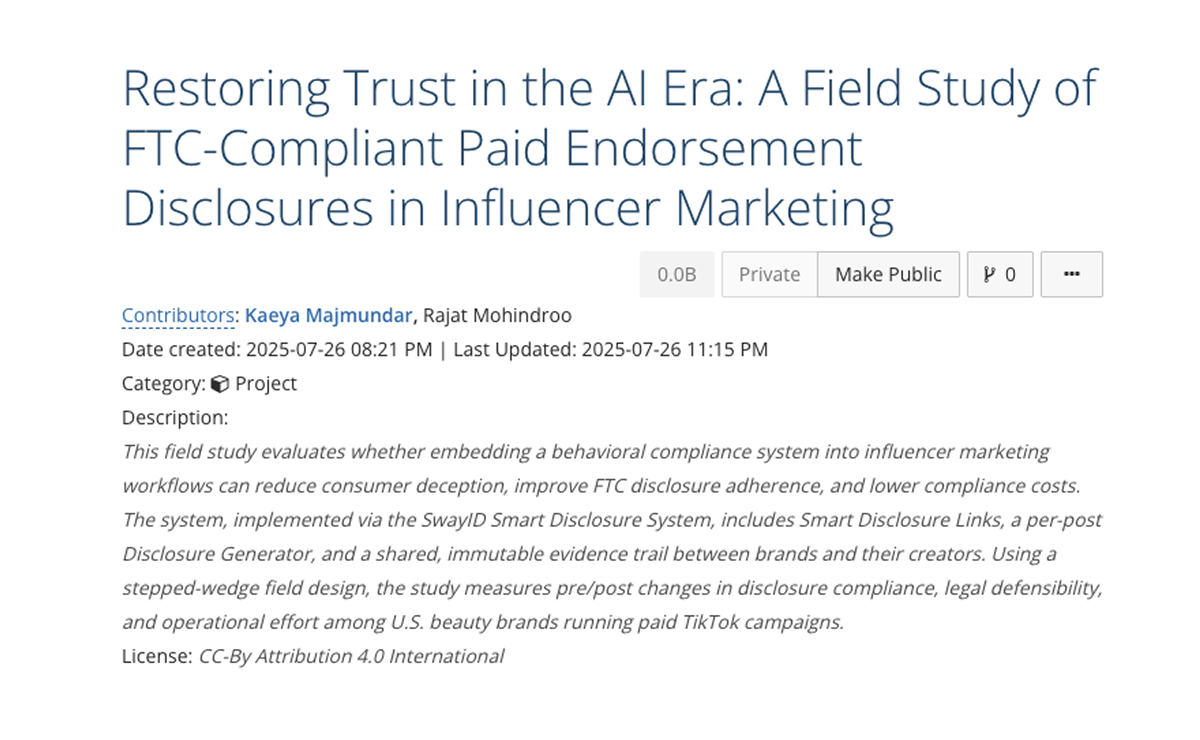
.svg)



💨 Publish truthful, compliant UGC ads in 3 minutes — not 3 weeks.



Does SwayID work? We're conducting a study to find out.
We’re running a live, OSF-registered field study with 5–7 beauty brands to measure real-world FTC compliance outcomes, legal defensibility, and operational impact.

Study Overview
Can a behavioral compliance system reduce deception and make influencer marketing trustworthy again? This live field study is evaluating whether embedding a structured compliance system into influencer workflows can:
1. Improve FTC disclosure rates
2. Reduce internal compliance effort
3. Restore legal defensibility in the age of synthetic content
WHAT WE'RE STUDYING
The system under evaluation is the SwayID Smart Disclosure System, which includes:
1. A per-post Disclosure Generator that standardizes FTC language, placement, and linkage
2. Smart Disclosure Links that auto-update across creator and brand surfaces
3. A shared, immutable Court-Grade Audit Log for timestamped proof of compliance
We’re running a stepped-wedge field study across 5–7 U.S. beauty brands to measure disclosure compliance, auditability, and operational friction before and after implementation.
WHAT'S PUBLIC NOW
This study is pre-registered and transparently documented on the Open Science Framework (OSF).
You can view:
1. Study design and hypotheses
2. FTC-aligned audit rubric
3. Privacy, ethics, and data handling practices
4. Planned analysis methods
WHY IT MATTERS
1. $43,792 FTC fines per post (per 2024 ruling)
2. $400M+ in class action exposure tied to influencer campaigns
3. Erosion of consumer trust due to synthetic and undisclosed content
Most brands still rely on ad hoc, unverifiable methods. This study asks: Can infrastructure fix it?
SwayID Research FAQs
SwayID Research exists to design and rigorously test systems that restore and maintain consumer trust in advertising — especially in the AI era. We publish our studies publicly to validate that our compliance infrastructure is both legally defensible and behaviorally effective.
SwayID Research is led by the internal compliance, legal, and systems design teams at SwayID. Our research is authored by internal staff and external collaborators with relevant domain expertise.
All research is pre-registered and published through The Open Science Framework (OSF), a public registry used by researchers and institutions worldwide.
These formats are the most legally volatile and least regulated spaces in digital marketing today. We aim to provide evidence-backed infrastructure for high-risk verticals like beauty, wellness, fintech, and more.
We use real-world field trials such as stepped-wedge or pre-post studies with active brand and creator participants. We measure real compliance outcomes like FTC violation rate, internal cost, and stakeholder confidence.
Yes. We are currently recruiting mid-market brands for future studies. Contact research@swayid.com learn more or apply.
Yes. Our studies rely on creator behavior to measure compliance outcomes, but all creator data is anonymized unless express permission is granted.
We collect operational data from platform usage, but all raw data is securely stored and de-identified before analysis. No personal data is ever shared or published without express consent.
Our operational compliance studies do not target consumers directly and typically do not require IRB review. If individual-level survey data is collected, we work with brand partners to confirm local review requirements.
Yes — and we disclose that openly. Our studies are designed to be reproducible, and we publish both the protocols and the code used in analysis to ensure accountability.
Each study has a full, timestamped research protocol available on OSF. The current flagship study on Smart Disclosures is available here.
The first sponsored content protection solution undergoing a live, OSF-registered field study.
We're not just claiming legal defensibility. We're proving it. Our protocol, audit rubric, and compliance outcomes are now public and traceable in real brand campaigns.
.svg)

.avif)

.svg)


